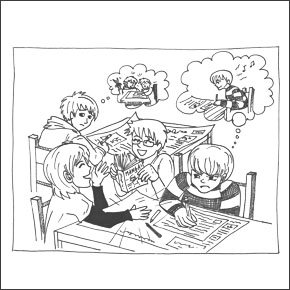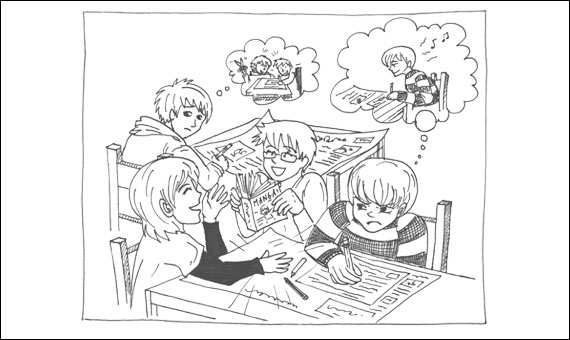

Group projects allow students to practice the art of compromising and resolving differences of opinion, as well as making advances and progress in core classes. Teachers have students collaborate on a project to instill in a class certain important material.
This work prepares students for independent studies, meaning learning without a teacher, thus allowing students to gain skills necessary in college, as well as giving students the responsibility of taking initiative in their learning. Studies note that early exposure to group projects should help eliminate issues like trouble resolving conflicts or communication problems and teach students how they can fit into a group environment like that of an office.
However, when labor is divided for some group projects, students gain knowledge only about their portion of the project. As a result, they might miss concepts or topics covered in the other portions.
“If the material was being taught in class, a teacher might go over something that a student might overlook. In groups everyone does sections, and people only know one of them,” says junior Smita Jain.
“[For in-class projects] I want to be available and help to reinforce the material. It’s a break from the normal routine,” says Spanish teacher Benjamin Ho.
In order to ensure that work is equally shared during a project, Ho has students indicate on the back of pages who did what part of the project.
Like Ho, teachers have different ways of grading group projects, and ensuring that every member of a group participates equally. Many group projects are graded as a whole and every member receives the same grade.
In an effort to ensure a balance in group work, history teacher Frederick Chancellor makes a chart that has his students grades, in terms of percentage, ranked from highest to lowest. He will go down the list and number off the groups.
English Teacher Dena Johnson says, “For the recent Lord of the Flies group project that I assigned, my AS students could work with any other AS student from other periods… I feel bad if a student in my class doesn’t have any friends in that period.”
Sophomore Alexandra Griffis says, “I love when group projects are with friends, but it doesn’t always have to be like that for me to like it. I met some really nice people for this project where I didn’t know some of the kids. We were randomly assigned groups, and the work was evenly proportioned and it was a lot of fun. We even made a Facebook group for it.”
Junior Greta Ruttenberg says, “When we did the brochure project in history last year, I was with my best friend and we divided it up nicely. We were one of the first groups done. We got an A, so I loved that project.”
However, when Ruttenberg is placed with students whom she does not know well and they are not participating equally, Ruttenberg has strategies. She says, “I ask certain people specific questions so that they’ll talk… If it’s outside of class, I might assign certain people specific parts to complete.”
Sophomore Malea Lamb-Hall says, “I always end up either doing the majority of the work and [others] take credit, or I can communicate with my partners because they are my friends and it’s even… Most of the time I do the work though.”
Jain says, “I subconsciously gave myself the extra section to do for this biology project last year. There was one left over section to assign and I didn’t trust anyone but myself.”
Johnson says, “I am not always able to ensure that every student participates equally, although I do my best. Sometimes I assign reflections. I have given out different grades for the same project before.”
Group projects allow many types of students to excel. They often have an artistic component to them, and combined with the academic portion of the project, they appeal to both artistic and academic audiences.
Not all participants enjoy group projects though, and sophomore Leah Cooper is among them. Cooper says, “I do not enjoy group projects, they take a lot of effort, there are conflicting ideas, and they are challenging to arrange.”
Projects that are assigned to be completed outside of class add another layer of complexity to group work, such as the inevitable conflicting after school and weekend schedules, leading students to often feel stressed out by the planning of an out-of-school project.
Cooper says, “It’s hard when you work with someone you don’t know well. You don’t always have their [contact] information. Outside of school everyone has different activities so that’s difficult. Communication is hard.”
However, as Chancellor puts it, “People must learn to work together.”



